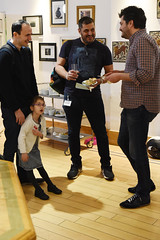I was born with congenital aniridia (sporadic) and nystagmus. At school I struggled and was regarded as being dyslexic. Then after leaving school and going to college I was told that I was not dyslexic.
I could not understand why this was, but I have always regarded my situation, more as a challenge than a problem. So I just carried on as normal.
But when I went to a different collage, I was told that I was not dyslexic, but I had dyslexic tendencies and I did not hear words properly. I found this confusing, but just ignored it and carried on.
After years of living with my condition and never meeting any one with my condition, I decided to go to the Aniridia Network UK 2011 Annual General Meeting, more as a social event than anything.
One of the guest speakers was Doris-Eva Bamiou. Who gave a talk on CAPD (Central Audible Processing Disorder). As I listened to the talk, I found myself ticking boxes. I started to think that she could have been talking about me. So after the talk, I got the chance to talk to her personally. After a short talk she said that it sounded like I had CAPD, but I would have to contact my GP and get a referral.
So when I get home I contacted my GP as soon as I could. My GP referred me and within a month I was diagnosed as having CAPD.
The more that I think about it now, the more that things in my life make scenes. I have always struggled to communicate and take things in when I am in a noise environment. Thinking about it most of my problems at school and college, that I had put down to my sight or dyslexia, are in fact CAPD.
I wasn’t sure what could be done as I am 41 now. But I had an appointment at the hospital at the beginning of July.
It went ok. We talked about my condition and that as my brain is fully developed – there is nothing that can be done to correct it. But there are techniques that i can use to limit the condition:
- manly avoiding conversations in noisy places
- asking people to speak directly to me face to face, not at the side so that I can see their face and apparently lip reading helps.
- also trying to have discussions in rooms that have carpet, soft furnishings and curtains helps.
By Andrew









Thanks for a greaat read